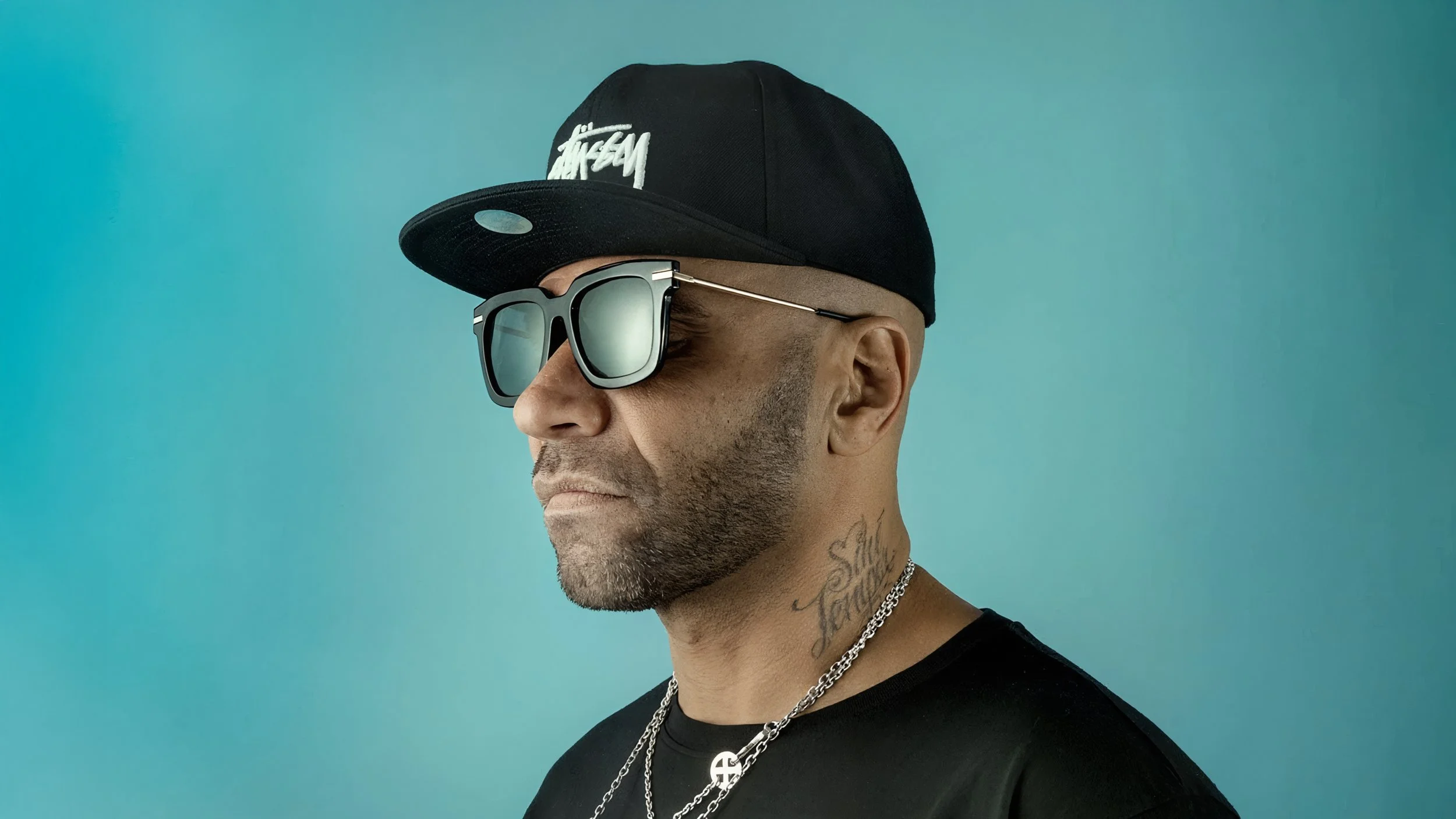
Goldie
Name & Pronunciation: Goldie (Clifford Joseph Price) - pronounced GOL-dee.
Years Active & Status: 1992 to Present (active)
Origin & Heritage: Walsall, England; British with Jamaican heritage and deep ties to UK rave culture and Caribbean sound system traditions.
Hook: Goldie is one of the defining architects of modern bass music whose work in jungle and drum and bass absorbed dub and reggae sensibilities and translated them into cinematic, bass-led electronic compositions that influenced generations. His records blend orchestral sweep, dubbed low end, and breakbeat propulsion—making him a crucial touchpoint for any ReggaeEDM conversation about how reggae aesthetics migrated into electronic music.
Motto/Tagline: "Music is a long conversation between the past and the future."
BIOGRAPHY
Clifford Price adopted the name Goldie and rose out of the early 1990s UK rave and pirate radio scene as a graffiti artist, DJ and producer who would come to personify the collision of urban street culture, reggae/dub aesthetics and the emergent drum and bass movement. He co-founded the Metalheadz collective and label, which became a hub for forward-thinking producers who admired reggae’s low-end politics while pushing breakbeats faster and farther than before.
Goldie’s 1995 debut album Timeless mapped a new emotional geography for electronic music: it combined orchestral arrangements, mournful vocal performances, and the spaced, echoing bass sonics of dub with chopped Amen breaks and frenetic percussion. The result was music that felt both soulful and ruthless, where a reggae-informed emphasis on bass weight and space met modern production techniques to create drama on a cinematic scale.
Across subsequent releases and projects, including collaborative Rufige Kru material, remix albums and DJ mixes, Goldie kept returning to dub-informed production choices: heavy sub-bass, echo and delay treatments, sparse low-frequency arrangements, and the use of vocalists as conscious, human anchors. He also pursued ambitious concept pieces and long-form suites that referenced classical composition while retaining the swung, syncopated energy of jungle.
Beyond records, Goldie expanded into film, acting and curating, bringing Metalheadz parties, the Rufige Kru identity, and retrospective reissues to new audiences. His stewardship of Metalheadz and continued performances have kept him in active dialogue with younger producers, ensuring the lineage from reggae to modern bass music remains visible and influential.
REGGAEEDM ANALYSIS
Reggae Roots
Rhythm: Goldie frequently reworks and fragments classic reggae and dub phrasing into broken, syncopated drum patterns. He softens the straight one-drop feel by stretching and chopping breaks, then reintroduces regeneration points of space and swing that feel kin to sound-system phrasing.
Bass: Goldie treats the bass as the narrative spine. Sub-bass is mixed forward with analog warmth and generous low-frequency headroom; basslines move between sustained dub holds and skittering, rhythmic motifs drawn from jungle - a hybrid that honors reggae’s low-end priority while exploiting EDM frequency clarity.
Vocals/Message: Goldie’s use of vocalists ranges from soulful leads to processed, echo-laden phrases that act like dub vocal snippets. Lyrically, his records often wrestle with identity, memory and resilience - themes consonant with reggae’s conscious tradition.
Electronic/EDM Techniques
Sampling & Break manipulation: Goldie uses classic breakbeat chops as structural glue, heavily time-stretched and layered beneath dub-style pads and orchestral swells to keep rhythmic momentum while opening space for low-end ambience.
Spatial FX & Dub Processing: He integrates delay lines, spring-like reverbs and mid/side processing to create depth and an audible sound-system sense of distance; echoes are used compositionally to answer and reroute musical phrases.
Hybrid Orchestration: Goldie juxtaposes acoustic orchestrations and choirs with synthesized bass and aggressive percussive edits, producing a cinematic palette that enhances the emotional weight typical of reggae anthems but in an EDM framework.
Essential Works & What to Listen For
"Inner City Life" (1995): Listen for the mournful vocal performance riding above skittering amen breaks and a cavernous sub-bass that borrows dub’s space and tension.
Timeless (1995): The record that made Goldie a household name in electronic music; listen for the fusion of orchestral textures, dub-informed bassweight and long-form track construction.
Saturnz Return (1998): Ambitious and divisive, the album’s centerpiece suite deploys sustained strings, choirs and heavy bass as a personal and emotional reckoning—hear how dub dynamics inform the track pacing.
The Alchemist - Best Of 1992-2012 (2013): A curated view of Rufige Kru and Goldie material that shows the through-line from early hardcore and jungle to more produced, dub-aware arrangements.
The Start of No Regret (2022): A later-career statement that updates Goldie’s signature interplay of vocalists, heavy low end and modern production gloss while keeping reggae-derived space in the mix.
Alpha Omega (2025) - Goldie Presents Rufige Kru: A recent return to the Rufige Kru project with collaborators that lean into heavy grooves and vocal interplay—listen for modernized dub textures and live-feel elements.
Influence on ReggaeEDM
Innovations: Goldie pioneered large-scale integration of orchestral composition and dub aesthetics within breakbeat and drum and bass frameworks. He normalized treating the bass as both emotional core and physical force in club contexts.
Impact: His work informed producers across electronic genres who sought to reconcile reggae’s depth and conscious vibe with club-centric tempos, helping spawn darker, bass-first EDM variants that nonetheless kept space and message central.
RECOMMENDED ALBUMS
Timeless (1995)
Spotify: https://open.spotify.com/album/67HPieOqDZ6G7WOM09Egbk?source=reggaeedm.com
Key tracks: "Inner City Life," "Timeless," "State of Mind"
Notes: Goldie’s breakthrough - sweeping, cinematic drum and bass with a dub sensibility; essential for understanding how reggae space migrated into EDM.Saturnz Return (1998)
Spotify: https://open.spotify.com/album/4Gkv1GWeEbjzCynxMypqVn?source=reggaeedm.com
Key tracks: "Mother," "Truth," "Temper Temper"
Notes: Polarizing and expansive; contains long-form suites that merge orchestral and dub approaches.The Alchemist: Best Of 1992-2012 (2013)
Spotify: https://open.spotify.com/album/3nQSsedDYDOYYEDMggrol0?si=jOWa_TU7QoWeR9QU_RmhJg?source=reggaeedm.com
Key tracks: "Terminator," "Inner City Life," "Malice In Wonderland"
Notes: A curated anthology highlighting the Rufige Kru output and Goldie’s evolution from hardcore/jungle roots to polished productions.The Start of No Regret (2022)
Spotify: https://open.spotify.com/album/4BxTXHiZAesqIvR6Dv2Lnw?source=reggaeedm.com
Key tracks: "The Start of No Regret," "Paradise (feat. LaMeduza)," "I Saw Her Last Summer"
Notes: A contemporary Goldie record that re-engages vocal collaborators and modern sound design while retaining dub-informed low end.Alpha Omega - Goldie Presents Rufige Kru (2025)
Spotify: https://open.spotify.com/album/4RqkoyzwiQiTiemmchAR96?source=reggaeedm.com
Key tracks: "Alpha Omega," "Goldikus (feat. Cleveland Watkiss)," "Sandcastles"
Notes: A recent Rufige Kru outing that combines live-feel arrangements with heavy, modern low-frequency production.Ring Of Saturn EP (1998)
Spotify: https://open.spotify.com/album/7jqM0pB4tvEWheryMR5cfE?source=reggaeedm.com
Key tracks: "Mother (VIP - Vocal Mix)," "I'll Be There for You," "Dragonfly"
Notes: Companion EP material from the Saturnz Return era showcasing alternative mixes and VIP treatments.







